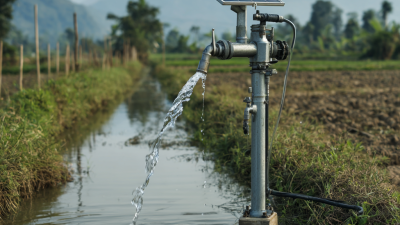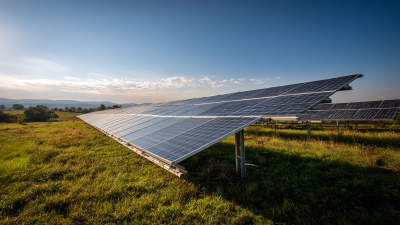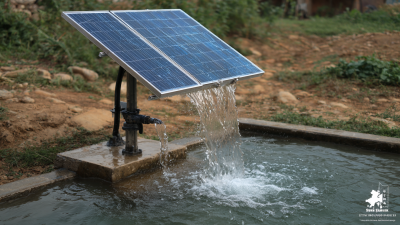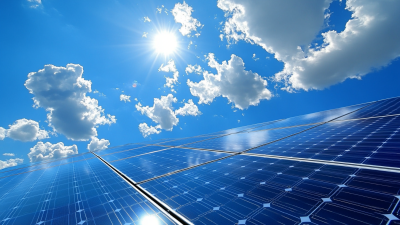Unveiling the Benefits of Solar Irrigation: What You Need to Know for Sustainable Agriculture
In an era where sustainable agriculture is more crucial than ever, solar irrigation emerges as a transformative solution that not only enhances productivity but also addresses environmental concerns. The integration of Solar Irrigation systems allows farmers to harness the sun’s abundant energy to power their watering needs, significantly reducing reliance on conventional, fossil fuel-based methods. This innovative approach not only leads to substantial cost savings but also promotes water conservation, ensuring that this vital resource is used more efficiently.

As we unveil the myriad benefits of Solar Irrigation, it becomes clear that this technology is not just a choice but a necessity for farmers looking to adopt sustainable practices while boosting their crop yields. Join us as we explore what you need to know about Solar Irrigation and its potential to revolutionize agricultural practices for a greener future.
Understanding Solar Irrigation: A Game Changer for Sustainable Agriculture
Solar irrigation is emerging as a transformative solution for sustainable agriculture, particularly in regions facing water scarcity. According to a report by the International Renewable Energy Agency (IRENA), solar pumps can reduce farmers' reliance on fossil fuels while simultaneously providing a renewable source of irrigation. This shift not only lowers operational costs but also reduces greenhouse gas emissions significantly. In fact, it's estimated that the adoption of solar-powered irrigation systems could cut emissions by over 30% in agricultural practices.
Tips for implementing solar irrigation effectively include assessing your water requirements and understanding the solar irradiance in your area. Farmers should evaluate the specific crops they are growing and their irrigation needs to appropriately size their solar systems. Additionally, installing energy-efficient drip irrigation methods alongside solar panels can further enhance water conservation and yield.
Investing in solar irrigation can also improve resilience against climate change. A 2021 study indicated that farmers using solar irrigation systems reported up to a 28% increase in crop yields due to more consistent water availability. Thus, adopting solar solutions is not just an environmentally conscious choice; it's a strategic move towards achieving greater agricultural productivity and sustainability.

Key Advantages of Implementing Solar-Powered Irrigation Systems
Solar-powered irrigation systems offer numerous benefits that can significantly enhance sustainable agriculture. By harnessing renewable solar energy, farmers can reduce their dependence on traditional energy sources, which not only cuts operational costs but also minimizes greenhouse gas emissions. A recent study highlights that solar irrigation can decrease water consumption by up to 30%, as it promotes precision farming techniques that optimize water usage based on real-time data. This efficiency is critical in arid regions where water scarcity is a pressing concern.
Implementing solar irrigation technologies can also lead to higher crop yields and improved soil health. By providing a consistent and reliable water source throughout the growing season, these systems enable farmers to cultivate a wider variety of crops, effectively diversifying their production. According to industry reports, farms adopting solar irrigation have experienced yield increases of 20-50%, which translates to enhanced food security and better profitability for farmers. Additionally, the integration of solar energy systems into irrigation practices aligns with global sustainability goals, making it a viable solution for future agricultural challenges.
Key Advantages of Implementing Solar-Powered Irrigation Systems
This chart illustrates the key benefits of solar-powered irrigation systems for sustainable agriculture, highlighting water savings, energy cost reductions, labor efficiency, and environmental impact.
How Solar Irrigation Enhances Water Conservation and Crop Yields
Solar irrigation systems are rapidly gaining traction in the agricultural sector due to their ability to enhance water conservation and improve crop yields. According to a report by the International Renewable Energy Agency (IRENA), solar-powered irrigation can reduce the reliance on grid electricity and fossil fuels, allowing farmers to harness clean energy for their irrigation needs. This shift not only minimizes operational costs but also cuts greenhouse gas emissions, aligning agricultural practices with sustainable development goals.
Moreover, data from the Food and Agriculture Organization (FAO) indicates that implementing solar irrigation can increase crop productivity by up to 30%. The technology enables farmers to maintain optimal soil moisture levels, which is crucial in regions facing water scarcity. With efficient water management, crops can be irrigated more effectively, leading to healthier plants and higher yields. As soil health improves through sustained irrigation practices, the resilience of agricultural systems against climate variability strengthens, contributing to food security in vulnerable regions.

Navigating the Initial Costs and Long-Term Savings of Solar Irrigation
The transition to solar irrigation represents both an initial investment and a pathway to long-term savings for farmers looking to embrace sustainable agriculture. While the upfront costs can seem daunting, including expenses for solar panels, installation, and system integration, these investments are often offset by the reduction in traditional energy bills. Connecting to the expansive sunlight availability can significantly lower operational costs for water access, leading to improved profit margins and less reliance on fossil fuels.
Over time, the financial benefits of solar irrigation become increasingly evident. Not only do farmers experience decreased energy costs, but they may also gain access to government incentives or subsidies aimed at promoting renewable energy practices. The longevity of solar systems, typically lasting 25 years or more with low maintenance needs, ensures that investments pay off in the long term. By adopting solar irrigation, farmers can enhance their resilience against fluctuating energy prices, ensuring stable and sustainable agricultural production for years to come.
Case Studies: Successful Integration of Solar Irrigation in Farming Practices
The integration of solar irrigation in farming practices has gained momentum, showcasing compelling benefits for sustainable agriculture. A recent report highlights that the global agricultural sensor market size is projected to grow from $4.81 billion in 2025 to $9.32 billion by 2032, with a strong compound annual growth rate of 9.9%. This significant growth reflects a rising trend in smart farming solutions, including solar-powered irrigation systems that enhance efficiency and reduce water wastage.
Case studies across various regions demonstrate successful implementations of solar irrigation, leading to increased crop yields and improved resource management. For instance, the water-saving irrigation systems market, valued at $540 million in 2022, is expected to reach $870 million by 2030, growing at a CAGR of 6.2% from 2024 to 2030. Such advancements not only support the environment but also align with strategic goals outlined in rural revitalization policies aimed at progressive land reform. By adopting innovative approaches like “solar plus agriculture,” farmers are better equipped to meet the challenges of climate change while ensuring food security.
Related Posts
-

Exploring the Advantages of the Best Solar Water Pump for Irrigation Needs
-

How to Optimize Solar Irrigation Systems for Maximum Crop Yield
-

Unlocking Efficiency: The Advantages of Solar Panel Water Pumps for Sustainable Irrigation
-

Exploring Versatile Applications of Best Solar Panel Water Pumps and Effective Usage Tips
-

Exploring the Surge of Solar Pumps Demand at the 137th Canton Fair: Insights and Opportunities
-

How to Choose the Best Water Solar Panel for Efficient Energy Solutions
Contact Details
Address:
Solar Pump Solutions,
Borrisokane, Co. Tipperary, Ireland.
